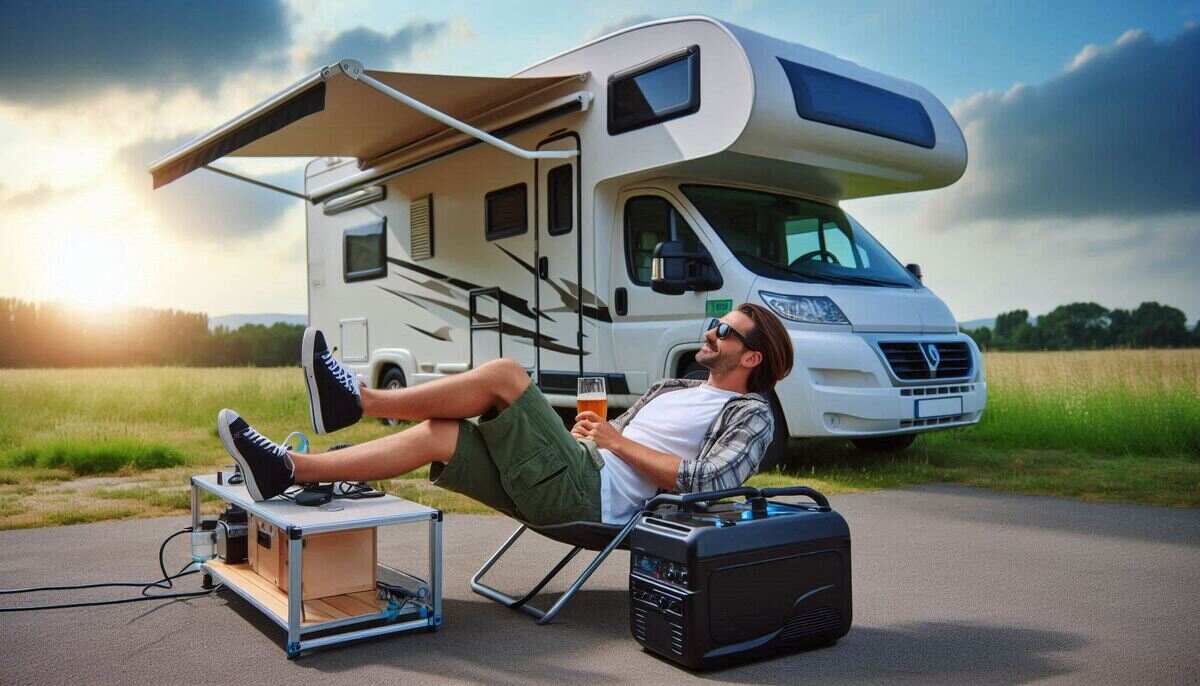Camping is a fantastic way to escape the hustle of everyday life and reconnect with nature. But while leaving the city behind can be refreshing, some comforts—like a little bit of power—can make camping a lot more enjoyable. That’s where a portable generator comes in. A good camping generator can charge your gadgets, power lights, and even run small appliances, giving you the best of both worlds: nature with a dash of convenience. In this guide, we’ll cover everything you need to know about choosing the perfect generator for your camping trips.
Why You Might Need a Generator for Camping
Generators may not seem essential at first, especially for those who enjoy going completely off-grid. But here are some solid reasons why you might want one:
- Charging Devices: From phones to cameras, we often carry gadgets that need charging. A generator can keep everything running without having to bring extra power banks.
- Running Small Appliances: If you’re camping with a mini-fridge or even just a coffee maker, a generator is the perfect power source.
- Lighting: It gets dark quickly in the wild, and while flashlights are great, having extra light can make evenings more enjoyable.
- Health Needs: For campers with health devices (like CPAP machines), a generator can be life-saving.
Key Factors to Consider
Not all generators are the same, and the right one for you depends on several factors. Here’s a simple breakdown:
- Power Output
- Generators are measured by their wattage, which tells you how much they can power. For camping, a generator between 1000 to 2000 watts is often enough. This range is great for charging devices, powering lights, and running small electronics.
- If you’re looking to power something larger (like a small heater or fridge), you might need closer to 2000 watts.
- Check the wattage of any device you plan to bring and add it up to see the power you’ll need.
- Noise Level
- One thing to remember is that generators can be noisy. Since you’re camping to enjoy nature, you’ll likely want something that’s quiet.
- Look for generators labeled as “inverter generators” as they tend to be much quieter. Some models have noise levels around 50-60 decibels, which is similar to a normal conversation and won’t disturb you or nearby campers.
- Fuel Type
- Gasoline Generators: These are common, but they do require you to carry gas with you, which may not be ideal if you’re hiking to your campsite.
- Propane Generators: They run cleaner than gas, but propane tanks can be bulky.
- Solar Generators: Perfect for eco-friendly campers, solar generators don’t require fuel. They’re quiet and work off sunlight. However, they rely on sunny days and often take longer to charge. A solar generator with a battery pack can store power, which helps if there are cloudy days.
- Portability and Weight
- For camping, you’ll want a lightweight and portable generator. Aim for something under 50 pounds. Some generators even come with carrying handles or wheels to make transport easier.
- Solar generators, which don’t require fuel, are generally lighter and easy to carry. Just keep in mind that more power often means more weight.
- Run Time
- Different generators have different run times based on their fuel capacity. Ideally, a camping generator should run for at least 6-8 hours on a full tank.
- For solar generators, check how long it takes to charge fully in sunlight and how many hours of power it can provide once charged.
- Budget
- Camping generators come in various price ranges. Basic, lower-wattage models can start around $200, while larger or solar models can reach $800 or more.
- Think about how often you’ll use the generator and what features are worth investing in. For weekend camping, a budget-friendly model might do just fine, while regular campers might prefer a more durable, higher-quality option.
Types of Generators for Camping
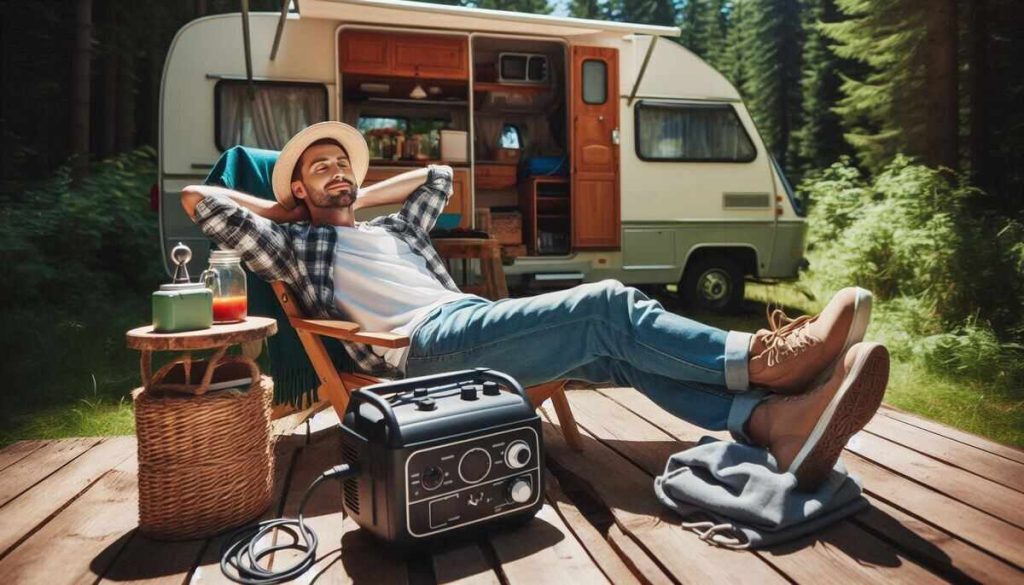
Camping generators can be broken down into a few main types:
- Inverter Generators
- These are known for being compact, fuel-efficient, and quiet. They’re also more stable in power output, which is great for sensitive electronics like phones and laptops. They do cost a bit more than regular portable generators, but they’re well worth it for camping.
- Portable Solar Generators
- Solar generators are a top pick for eco-conscious campers. They’re completely silent and don’t need fuel, making them ideal for remote camping. The main downside is their reliance on sunlight, so they may not be the best for cloudy days or longer trips.
- Standard Portable Generators
- These are typically more affordable and have higher wattage options, but they’re also heavier and louder. They might work if you’re camping in a car-accessible area, but they’re not ideal for remote camping due to their weight and noise.
Helpful Tips for Using a Camping Generator
- Choose a Campsite Wisely: If you’re bringing a generator, try to camp at least 50 feet away from other campers to avoid disturbing them.
- Protect It from Rain: Most generators aren’t waterproof, so keep it covered or bring it under a shelter if it starts to rain.
- Bring Extra Fuel (if Needed): If you’re using a gas or propane generator, plan for how much fuel you’ll need. Carrying extra can help in case you stay longer or use more power than expected.
- Use Power Wisely: To get the most out of a small generator, avoid running too many things at once. It’s better to charge devices one at a time, so the generator doesn’t get overloaded.
Best Portable Generators for Camping
Here are a few popular models that campers love:
1. Honda EU2200i Inverter Generator:
The Honda EU2200i is one of the top choices among campers for its outstanding performance and reliability. Known for its quiet operation, it’s ideal for both remote campsites and established campgrounds where noise restrictions are common. This model offers 2,200 watts of power, which is enough to handle multiple small devices at once, like a coffee maker, lights, and phone chargers.
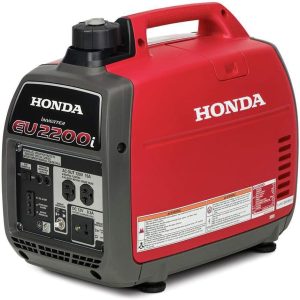
- Pros: Extremely quiet (about 48-57 decibels, similar to a normal conversation), lightweight at just under 47 pounds, and highly fuel-efficient. It has a fuel shut-off valve that allows the engine to run with the fuel supply off to prevent stale fuel issues.
- Cons: This generator is a bit more expensive than others in its class, but for many campers, the durability and performance justify the price.
2. Jackery Explorer 1000 Solar Generator:
The Jackery Explorer 1000 is a popular choice among eco-conscious campers and is entirely solar-powered, which means it doesn’t require gas or fuel. This model provides 1,000 watts of continuous power, perfect for charging small appliances, phones, laptops, and even running a mini-fridge. It’s extremely quiet, producing no noise at all since it doesn’t have a traditional engine.
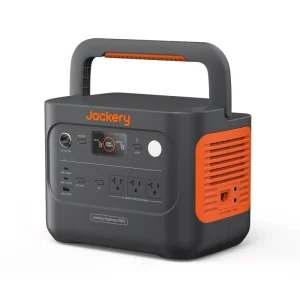
- Pros: Zero emissions, silent, and super easy to use—just plug in the solar panels during the day, and you’ll have plenty of stored power for the night. It’s lightweight for a solar generator, weighing about 22 pounds, and can be paired with Jackery’s solar panels for a complete solar-powered setup.
- Cons: It relies on sunlight, so it’s best for trips with predictable sunny weather. Also, the solar panels are sold separately, which can add to the overall cost.
3. WEN 56200i Inverter Generator:
The WEN 56200i is a budget-friendly inverter generator known for its low noise levels and impressive portability. This model offers 2,000 watts of surge power and 1,600 watts of running power, making it perfect for charging devices and running small electronics. It’s a solid choice for campers who want reliable power without the hefty price tag.
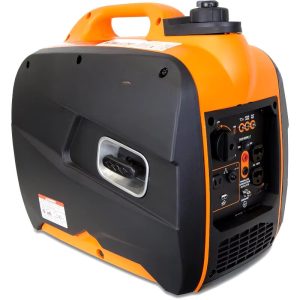
- Pros: Very quiet (approximately 51 decibels at quarter load), weighing just 48 pounds, and equipped with an eco-mode to adjust fuel consumption based on the power needed. This generator also has USB ports for direct charging of devices, which is convenient for camping.
- Cons: While it’s a great option for most camping needs, it may struggle with larger power demands or heavier appliances. Also, it’s not quite as fuel-efficient as the Honda, though it’s still reasonable for the price.
Final Thoughts
Choosing a generator for camping is all about balancing power, portability, and noise. An inverter or solar generator is ideal for most campers, but your needs might vary depending on what you’re bringing and where you’re camping. A small, quiet, and reliable generator can make camping a little more comfortable without taking away from the experience of being in nature. Remember to always follow local rules on generator use to keep camping fun for everyone! Happy camping!
